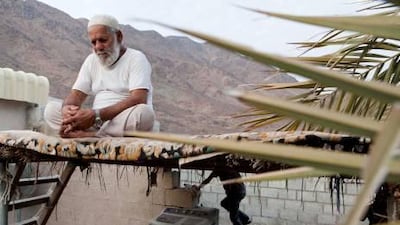RAS AL KHAIMAH // For generations, bedouin communities have found solace from the heat in the mountains, where the temperatures are five to 10 degrees cooler and shade is more plentiful.
Stone homes and access to fresh water provided respite from the unbearable temperatures in a time before the soothing luxury of air conditioning.
Special report: The Desert Survival Guide
The desert is a tough place to live. For generations, people survived through the UAE's sweltering summers by managing to eke out limited and hidden food, water and shelter. Our reporters look at how they managed it, what they ate – and how those secrets of survival still affect the lives of ordinary Emiratis today.
More from The National on desert survival
For many communities today, their existence remains as simple as those earlier times, but not as hard. Their lives are now stationary, unlike those of their ancestors who moved between the coast, desert and mountain regions with the seasons.
"Life is very different today," says Ali Abdullah Ali Al Dahmani. Nobody quite knows his age, although some estimates put it as high as 90.
He has just had a baby with his second wife, and is living proof that the hard life of the mountains builds a strong man.
"We were stronger than men today, more active," he says. "We were like the ghazal in the mountains. A man who walks in the mountains can walk in the desert but a man from the desert cannot survive in the mountains. It is a different terrain."
Mr Al Dahmani still refuses to use air conditioning. Instead he sleeps under the shade of the palm frond outside his home, raised just a few feet from the ground away from snakes or scorpions, even the odd wild cat. He was never afraid of these creatures - they were more afraid of humans, he says.
Villages were focused around the fertile wadi or the valley areas, to be close to water.
"Life was tough but people were closer, we faced things altogether. We'd even get food from our neighbours when we had no money, we were very involved as a community. We had no money but we didn't care. We always had water, summer or winter - that was never a worry like it was in the desert.
"Now, there is less rain so we have less water."
There were no schools, no hospitals, but things were dealt with by the community. When there were any risks of tribal conflict, the families would retreat higher and deeper into the mountains, relying on instinct to navigate the terrain.
"You can never go too deep in the mountains," he said. "It's not like the Empty Quarter [desert]. We always had things like other farms as markers."
Income and sustenance came from the land, with camels, sheep, chickens and goats being reared for meat while horses and donkeys were used for transportation, carrying heavy loads or jugs of water up the mountainsides.
Tobacco and grains such as corn were also vital sources of income, taken to the coast in Oman or Fujairah to be traded at the markets, where families would also stock up on food items.
"Donkeys can travel up the mountains like no other animal," said Khalifa Al Ketbi, who has spent his life between the desert of Dhaid and the mountainous regions of Ras al Khaimah.
The farms are now relics of a bygone age, run more to maintain the tradition than as a means of subsistence, and costing more to operate than the Dh4,000 monthly subsidy the government gives the farmers.
Electricity has transformed their lives. The wells that once took weeks to dig by hand and were operated with ropes and pulleys are now powered by electricity.
The falaj irrigation channels remain one of the few original signs of the past way of life. The watering system still holds a firm place in people's hearts even if the municipality is keen to encourage more modern methods of irrigation.
"A lot of water evaporates in the heat from the falaj," Mr Al Ketbi observed. "Pipes would be more efficient."
The water levels are getting lower and lower with the lack of rain."In the old days, the water would last for just one hour before it had been emptied. It would be two or three more hours before it would refill," Mr Al Ketbi said.
Before, families slept as soon as darkness fell - once they had made one last check on their farms and land.
"At sunset, most of the men would go out, watching their animals and farms," said Mr Al Ketbi. Old habits die hard, and the tradition is still much the same today.
The young generation show unfailing dedication to their heritage, even if they now drive around in big cars and have jobs in nearby towns.
Only about 10 or 20 per cent of those brought up in the mountains leave for lives in the city, Mr Al Ketbi says. "There is something special here. It is a very peaceful place."
Abdullah Al Dahmani is just 25 and works in the army in Sharjah but clings strongly to his heritage.
"I want to be modern but do not want to forget the past. We learnt about our past from our grandfathers and I want to pass these traditions to my children," he said.
Every day he drives back and forth on the one-hour drive to work from his village in Ras al Khaimah, surrounded only by farms which are many miles apart.
"In the city there is no freedom, no movement. I'd be stuck in a flat, or a house. Here, I can go outdoors, in the rain. In the city I wouldn't even know my neighbours."

